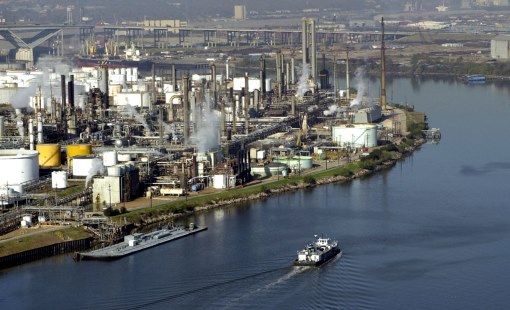Energy
Will Houston Ship Channel Closure Prolong a Spike in Oil and Gasoline Prices?
Published:
Houston, Galveston, Baytown and Texas City are supposed to be good for oil and energy. When an accident occurs that shuts down the Houston Ship Channel, it turns out to be a drag on the nation’s oil and gas supplies — roughly 11% of the U.S. refining capacity is in the area. A weekend oil spill closed down the ship channel on Saturday, and it remained closed on Tuesday morning. The price of oil and gas could be affected if this closure lingers on much longer.
The closure from this weekend has delayed shipments of crude and refined products in and out of the channel. Platts said even on Monday that this closure appears to have contributed to a rise in oil prices.
The incident was coincidentally timed around the 25th anniversary of the Exxon Valdez disaster. The good news is that the Bolivar ferry service resumed on Monday, a sign that the cleanup efforts of this oil spill are expected to be largely contained.
The Coast Guard report from Monday evening said:
There are 46 outbound vessels and 47 inbound vessels in the queue for transit in the Port of Houston. The Port of Texas City has 5 inbound and 3 outbound vessels in the queue awaiting transit. Once the channel has been determined safe to navigate, and transiting vessels will not spread oil contaminants, a prioritization list will be established to determine the entry order of vessels.
The Coast Guard also said that more than 71,000 feet of containment boom have now been deployed on waters surrounding the incident site and along sensitive shorelines. An additional 192,500 feet of boom also have been staged for possible deployment, along with another 20,680 feet ordered.
World Maritime news has signaled that Exxon Mobil Corp. (NYSE: XOM) has had to cut production at its Baytown, Texas, refinery.
Kirby Corp. (NYSE: KEX) shares were down close to $2 since last week, based on the accident, as its subsidiary Kirby Inland Marine was the operator of the barge. Kirby recently announced that it has some 29 more inland barges on order, and the near-$6 billion company in market value had 2013 revenues of $2.24 billion.
Dow Jones signaled that Marathon Petroleum Corp. (NYSE: MPC) and Valero Energy Corp. (NYSE: VLO) have not responded to questions on how their refinery operations have been impacted.
Platts reported on Monday afternoon that NYMEX May crude was $0.14 higher, at $99.60 per barrel, as investors were focused on the suspension of vessel boardings in the Houston Ship Channel. At 10:00 a.m. EST on Tuesday, the same May NYMEX WTI crude was fighting between being in the black or in the red.
Reports from flights over the area will tell if the Houston Ship Channel will be freed up to reopen. If the Houston Ship Channel resumes normal activities, then the spill’s impact on oil and gasoline prices will be very muted and very temporary.
If the closure lasts much longer, net delivery misses will begin and companies expected to have product to load and offload may have to declare force majeure. Guess what happens to oil and gasoline prices if that occurs and continues?
Retirement can be daunting, but it doesn’t need to be.
Imagine having an expert in your corner to help you with your financial goals. Someone to help you determine if you’re ahead, behind, or right on track. With SmartAsset, that’s not just a dream—it’s reality. This free tool connects you with pre-screened financial advisors who work in your best interests. It’s quick, it’s easy, so take the leap today and start planning smarter!
Don’t waste another minute; get started right here and help your retirement dreams become a retirement reality.
Thank you for reading! Have some feedback for us?
Contact the 24/7 Wall St. editorial team.